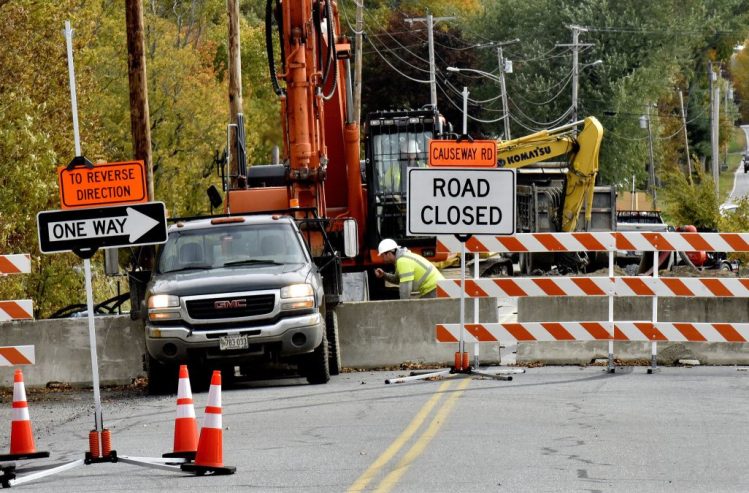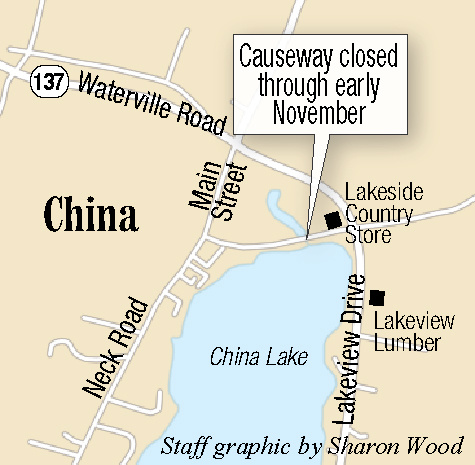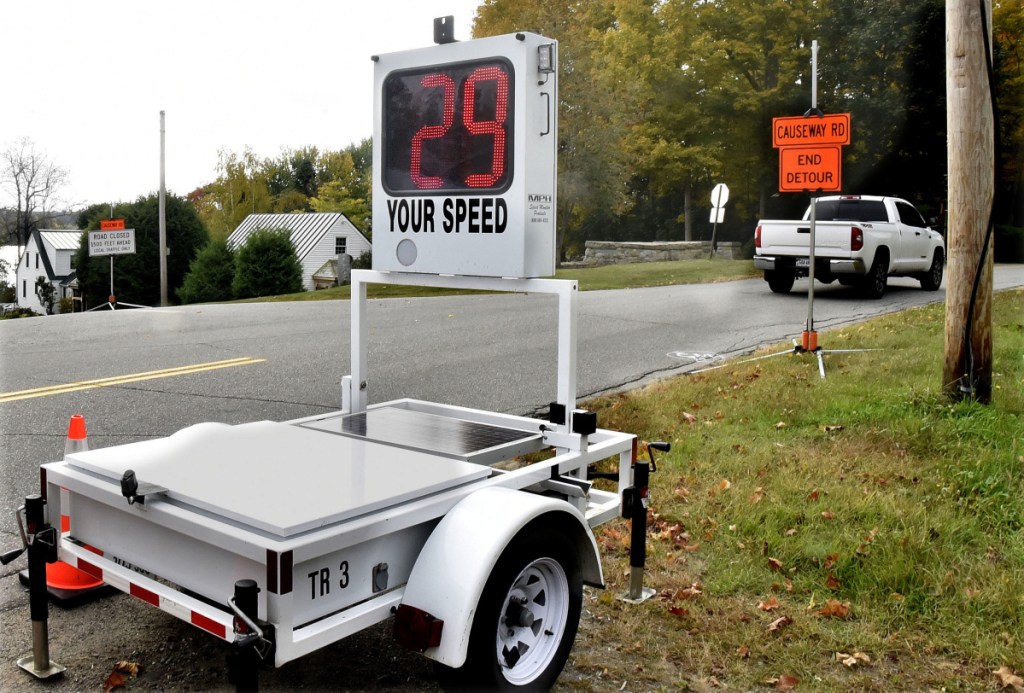CHINA — Repairs are underway to the nearly 90 year-old bridge that stretches over China Lake. A segment of Causeway Road is now closed until at least November 9, as workers reinforce and elevate the structure’s box culvert.
Though the road will get paved in the spring, it will be open to traffic through the winter. The boat launch remains accessible throughout construction. Updates to make the causeway a more walkable and accessible area for residents will carry on for another year or longer.
Causeway Road connects a part of Main Street to U.S. Route 202. A detour reroutes drivers around the bridge to a northern intersection of these two roads.
The current construction marks the first part of a two-phase project to renovate the roadway. The second phase will add recreational features to the area, including a sidewalk and a trail for snowmobiles and all-terrain vehicles on opposite sides of the road. Town Manager Dennis Heath expects work on phase two to begin in spring of 2019 and conclude by the late summer of 2020.
Residents approved the project at China’s Town Meeting in March 2017. Although some frustration was voiced at the time over the town’s lack of a specific plan, community members supported the goal of creating a safer and more usable space. Earlier that year, the Maine Department of Transportation said that the Causeway Road bridge was cracking and would last no more than 10 years.
Work began on the culvert on September 27 and has been going better than expected, according to Heath. The old bridge has been demolished, and Heath said that the submerged timber mat that supports the structure was in good condition and did not need to be replaced. After a fabric cover and stone are placed over the wood for reinforcement, workers will slightly elevate the culvert opening and feather its edges. A temporary road surface will then be laid down and work will resume in the spring.
“There’s been quite a bit of interest in the project as it’s gotten closer,” Heath said, noting that he had not received any negative feedback so far. “I think when you take into consideration that this is replacing a bridge that’s been there since 1939 and they’re getting something that’s new and updated and expanded, I think everybody’s really looking forward to it.”
The town of China has long been concerned about vehicles traveling too fast on the causeway and has wanted to cap the speed limit at 25 mph. “We see it as a safety issue,” Heath said. In late September, regional Traffic Engineer David Allen recommended to the commissioner of the Maine Department of Transportation that the speed limit on Causeway Road be lowered from 45 mph to 30 mph. Heath said that he hopes the state will reconsider lowering the limit further once phase two additions to the causeway bring pedestrians in closer proximity to traffic. An unofficial 25 mph speed limit sign was recently put up in the area. Heath said he does not know who is responsible for the action, and the town has not taken it down.
When the town approved the causeway project in 2017, its budget was set at $750,000. Heath said that a total closer to $850,000 is “believable for me,” which reflects added consultancy costs. The project is funded through tax increment financing involving Central Maine Power Co. upgrades. China receives $360,000 a year in tax revenue from CMP, which it must put towards economic development.
After the causeway renovations are complete, upgrades to the nearby boat launch are in store.
“Through a combination of the difficulty in launching the boats and also just the movement of the water out there at the head of the lake, (the ramp’s) concrete plates have separated and moved further down into the water, so they have this separation between them, and it’s broken up quite a bit,” Heath noted. “It needs to be rebuilt.”
In September, employees of the state’s Boating Facilities Program told Heath that if the town addresses parking deficiencies, it will finance and fix the boat ramp. Specifically, China needs to provide parking for 18 rigs and one spot that meets the requirements of the Americans with Disabilities Act. Right now, the town does not own the parking lot that people use near the causeway. The closest town-owned property is the lot that houses the fire department.
China residents will vote in a November referendum on whether or not to approve $5,000 for the town to research options to develop a compound on empty town-owned land at 571 Lakeview Drive that would contain fire, rescue, police and ambulance facilities as well as a community center. If the fire station eventually moves to this location, the town could raze the current building and turn it into a parking lot for the causeway. In the shorter term, Heath said the town is also considering negotiating a deal with the China Baptist Church to switch parking lots. The church owns a lot that is closer to the causeway.
The town has interest in buying the land that houses the current causeway parking lot. However, it is part of a much larger 32.21-acre property owned by Susan Bailey that spans both sides of U.S. Route 202. Bailey’s mortgage requires the land to be purchased altogether, but China only wants a maximum of 7 acres. Heath is researching whether the price of getting her out of that mortgage is worth it for the town. He will discuss options with the causeway project’s subcommittee next week.
Meg Robbins — 861-9239
Send questions/comments to the editors.






Success. Please wait for the page to reload. If the page does not reload within 5 seconds, please refresh the page.
Enter your email and password to access comments.
Hi, to comment on stories you must . This profile is in addition to your subscription and website login.
Already have a commenting profile? .
Invalid username/password.
Please check your email to confirm and complete your registration.
Only subscribers are eligible to post comments. Please subscribe or login first for digital access. Here’s why.
Use the form below to reset your password. When you've submitted your account email, we will send an email with a reset code.